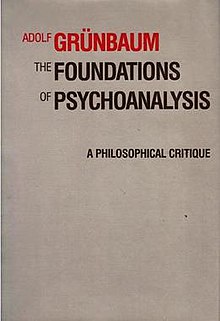The Foundations of Psychoanalysis

Cover of the first edition
|
|
| Author | Adolf Grünbaum |
|---|---|
| Country | United States |
| Language | English |
| Series | Pittsburgh Series in Philosophy and History of Science |
| Subject | Psychoanalysis |
| Published | 1984 (University of California Press) |
| Media type | Print (Hardcover and Paperback) |
| Pages | 310 |
| ISBN | |
The Foundations of Psychoanalysis: A Philosophical Critique is a 1984 book by Adolf Grünbaum, in which Grünbaum criticizes Sigmund Freud and the scientific credentials of Freudian psychoanalytic theory. Grünbaum argues that there are methodological and epistemological reasons to conclude that some central Freudian theories are not well supported by empirical evidence. Grünbaum's book was influential and has been considered the most important philosophical critique of Freud.
Grünbaum offers a critique of the scientific credentials of Freudian psychoanalytic theory, arguing that there are methodological and epistemological reasons to think that some central Freudian doctrines are not well supported by empirical evidence. (For example, Grünbaum is critical of Freud's theory of dreams, which he considers the cornerstone of psychoanalysis).
Despite taking this position, Grünbaum approves of Freud's interpretation of religion and argues against the idea that psychoanalysis is a pseudo-science. He criticizes Karl Popper's view that psychoanalytic propositions cannot be disconfirmed and that psychoanalysis is therefore pseudo-scientific. Grünbaum considers Popper, like many other philosophers who have written about Freud, to be both a poor reader of Freud and a poor logician. Grünbaum observes, for example, that Freud's theory that paranoia results from repressed homosexuality invites the obviously falsifiable prediction that a decline in the repression of homosexuality should result in a corresponding decline of paranoia, thereby disproving Popper's claim that psychoanalytic propositions are unfalsifiable.
Grünbaum criticizes the hermeneutic interpretation of psychoanalysis propounded by Jürgen Habermas in Knowledge and Human Interests (1968). He argues that Habermas misunderstands psychoanalysis, falsely maintaining that it abandons the scientific norm in its aspirations. Grünbaum, drawing on his knowledge of modern physics, contends that Habermas is ignorant of science.
...
Wikipedia
